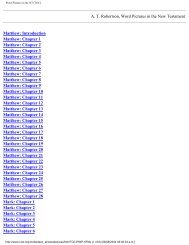Commentary on Joshua - Keil & Delitzsch - David Cox
Commentary on Joshua - Keil & Delitzsch - David Cox
Commentary on Joshua - Keil & Delitzsch - David Cox
Create successful ePaper yourself
Turn your PDF publications into a flip-book with our unique Google optimized e-Paper software.
<strong>Keil</strong> and <strong>Delitzsch</strong> <str<strong>on</strong>g>Commentary</str<strong>on</strong>g> <strong>on</strong> the Old Testament<br />
command of God was not a matter of such indifference to the servant of the Lord as<br />
Knobel imagines. There was no valid reas<strong>on</strong> after the capture of Ai for postp<strong>on</strong>ing<br />
any l<strong>on</strong>ger the solemn cerem<strong>on</strong>y of setting up the law of Jehovah which had been<br />
enjoined by Moses; and if we c<strong>on</strong>sider the reas<strong>on</strong> for this solemnity, to which we<br />
have already referred, there can be no doubt that <strong>Joshua</strong> would proceed without the<br />
least delay to set up the law of the Lord in Canaan as early as possible, even before<br />
the subjugati<strong>on</strong> of the whole land, that he might thereby secure the help of God for<br />
further c<strong>on</strong>flicts and enterprises.<br />
The account of this religious solemnity is given very briefly. It presupposes an<br />
acquaintance with the Mosaic instructi<strong>on</strong>s in Deut 27, and merely gives the leading<br />
points, to show that those instructi<strong>on</strong>s were carefully carried out by <strong>Joshua</strong>. Of the<br />
three distinct acts of which the cerem<strong>on</strong>y c<strong>on</strong>sisted, in the book of Deuter<strong>on</strong>omy the<br />
setting up of the st<strong>on</strong>es with the law written up<strong>on</strong> them is menti<strong>on</strong>ed first (Deut 27:2-<br />
4), and then (vv. 5-7) the building of the altar and the offering of sacrifice. Here, <strong>on</strong><br />
the c<strong>on</strong>trary, the building of the altar and offering of sacrifice are menti<strong>on</strong>ed first (vv.<br />
30, 31), and then (v. 32) the writing of the law up<strong>on</strong> the st<strong>on</strong>es; which was probably<br />
the order actually observed. - In v. 30 Jehovah is called "the God of Israel," to show<br />
that henceforth no other god was to be worshipped in Canaan than the God of Israel.<br />
On Mount Ebal , see at Deut 11:29 and 27:4.<br />
Verse 31-33. "As Moses commanded:" namely, Deut 27:5. "As it is written in the<br />
book of the law of Moses:" viz., in Ex 20:22 (25). On the presentati<strong>on</strong> of burntofferings<br />
and slain-offerings, see at Deut 27:6-7. - In<br />
v. 32 nothing is menti<strong>on</strong>ed but the writing of the law up<strong>on</strong> the st<strong>on</strong>es; all the rest is<br />
presupposed from Deut 27:2ff., to which the expressi<strong>on</strong> "the st<strong>on</strong>es" refers. "Copy of<br />
the law:" as in Deut 17:18; see the explanati<strong>on</strong> at Deut 27:3. In c<strong>on</strong>necti<strong>on</strong> with the<br />
third part of the cerem<strong>on</strong>y the promulgati<strong>on</strong> of the law with the blessing and cursing,<br />
the account of the Mosaic instructi<strong>on</strong>s given in Deut 27:11ff. is completed in v. 33 by<br />
the statement that "all Israel, and their elders (i.e., with their elders), and shoterim,<br />
and judges," stood <strong>on</strong> both sides of the ark before the Levitical priests, the stranger as<br />
well as the native, i.e., without any excepti<strong>on</strong>, <strong>on</strong>e half (i.e., six tribes) towards<br />
Mount Ebal, and the other half towards Mount Gerizim. For further remarks, see at<br />
http://207.44.232.113/~bible/comment/ot/k&d/josh/jos45.html (2 of 3) [13/08/2004 01:17:33 p.m.]
















